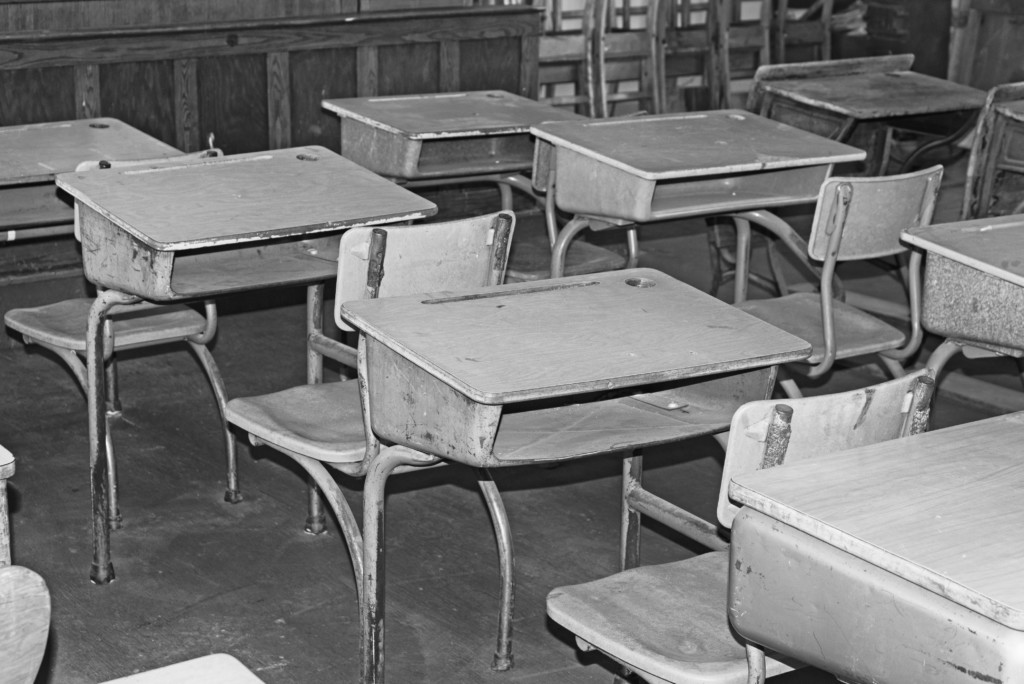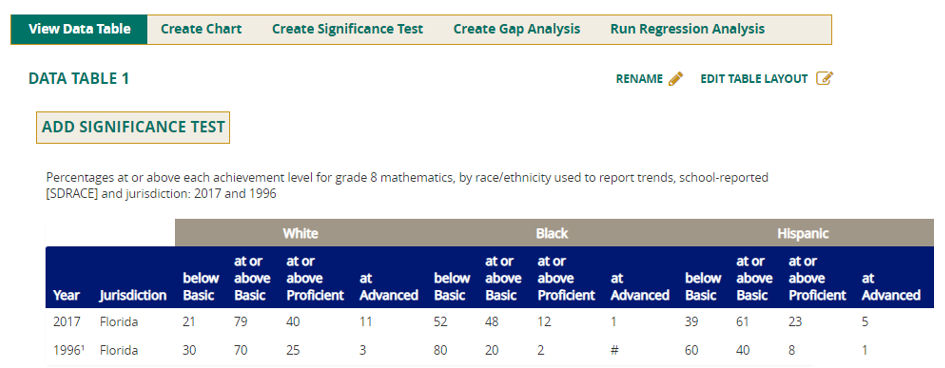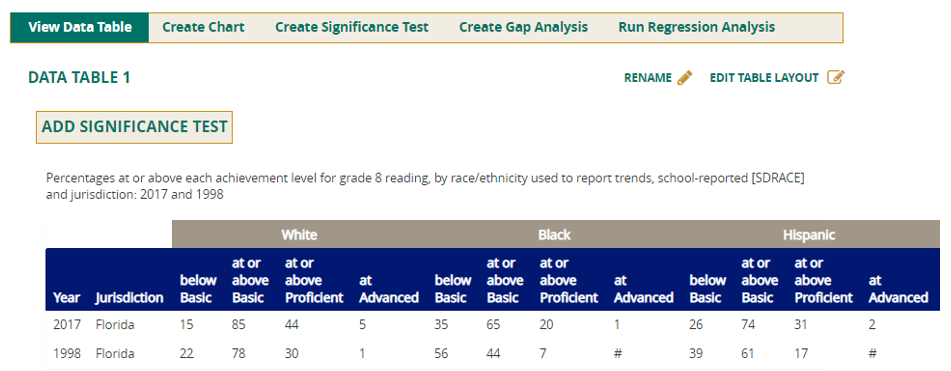 We humans seem wired to romanticize the past, which at times can be a fuzzy pastime, and at others, an unhealthy delusion. The phenomenon crops up frequently in our K-12 conversations, with people tending to assume schools were better in the past and that they’re much worse now.
We humans seem wired to romanticize the past, which at times can be a fuzzy pastime, and at others, an unhealthy delusion. The phenomenon crops up frequently in our K-12 conversations, with people tending to assume schools were better in the past and that they’re much worse now.
This is clearly not the case in Florida.
Take a look at this table from the National Assessment of Educational Progress for eighth-grade math. The data displayed are for the United States and Florida, and the three largest student ethnic/racial student groups. The years selected are the most recent available (2017) and the last available before the advent of the Bush reforms in Florida (1996).

We would like to see all students scoring “at or above Proficient,” but the reader should understand from the outset that NAEP proficiency is a laudably high bar; that approximately 50 percent of the students in the performing state, Massachusetts, are rated Proficient; and that Massachusetts compares well to Asian and European results on international exams. The reader also should understand that you want nothing to do with “Below Basic.”
In 1996, Florida’s white students were “underwater,” with 25 percent scoring Proficient or Better but 30 percent scoring Below Basic. Let’s call that a negative 5 (25 percent Proficient or Better minus 30 percent Below Basic). In 2017, the score for white students had moved to a positive 19. It is still very bad to see 21 percent of any student subgroup scoring Below Basic, but the trend is positive.
Words can scarcely describe how catastrophically awful the average math scores for black students were back in the 1990s; only 2 percent scored Proficient or Better, while 80 percent scored Below Basic. This means that in 1996, for every Florida black student scoring Proficient in eighth-grade math, there were 40 black students scoring Below Basic.
By 2017, there were miles yet to go, but a just over 4 to 1 ratio beats the living daylights out a 40 to one ratio. In terms of Proficient minus Below Basic, the score for Florida black students went from -78 to -40. The majority of Florida black students still, however, scored Below Basic.
A decade ago, when discussing Florida’s education reforms in Arizona, I encountered what came to be known as “the magic Cuban theory.” Florida’s Hispanic students were outscoring the statewide averages of many states (including Arizona) on fourth-grade reading. Rather than taking an interest in how they got this done, some in Arizona preferred to attribute the progress to Florida Hispanics being from Cuba.
This, of course, was a gross oversimplification of Florida’s diverse Hispanic community, but sometimes folks will overlook the details so long as a theory handily fits preexisting beliefs. Notice, however, that Florida’s Hispanic students were deep underwater on eighth-grade math in 1996 at -52, but down to -16 in 2017 – for a student population that was becoming progressively less Cuban over time, by the way.
The findings on eighth-grade reading are a bit different, but not much.

In 1998, the year of the last pre-reform exam for eighth-grade reading, white students stood at a +8, but that moved to a +29 in 2017. In 1998, only 7 percent of Florida black students were Proficient or Better in eighth-grade reading, with 56 percent Below Basic for a -49.
The needle had moved to a -15 by 2017, with the percentage of Below Basic dropping from 56 percent to 35 percent and the Proficient or Better percentage nearly doubling. Hispanic students were 22 points underwater in 1996, but at +5 in 2017.
None of this means that Florida education is great now, or even adequate. It all needs to get better. But in my mind, it does raise the question: Why would anyone romanticize Florida’s K-12 past? While the world as we knew it toward the end of the 20th century may seem swell in our water-colored memories of the way we were, things weren’t working out well for a distressingly large percentage of students.
It isn’t possible to make Florida education “great again” when the present is demonstrably superior to the past. The future can and must be better still. The present is much better than the past, but the best is yet to come.



Let’s put a lot of things in perspective – however you define the “good old days”, they rarely were all that great. You compare the Pre-Bush to Post-Bush era. I go back farther comparing my own education in the ’60’s, then following it up with the education my children received from the mid ’80’s through today (four and a half more years to go).
Just as I say that I could not start on a top level High School football team today (after three years of NCAA ball at big schools), I am also positive that every year from the ’60’s forward, our public school education performance has improved.
Since I haven’t had a kid in High School since early this decade, I toured an SUSD H.S. campus recently paying particular attention to Math classes.
I was a Math guy – a nerd before we were called nerds. I student taught Calculus when I first got to BYU. I continued in Math to extend my efforts as a budding Economist before heading off to Law School before completing the last 12 hours of a Bachelors.
Never in the 3.75 years of college did I ever accomplish what top Chaparral Students now can accomplish by Grade 12.
My point? Don’t get fooled by randomness. Bush didn’t make schools better. The good old days were a joke and every year the bar has been raised, Bush or no Bush, Charters or no Charters. I know that won’t stop you from trumpeting the greatness of Charters, but I suggest this – our schools have performed better year over year for decades for one reason – we wanted them to get better. And it is our nature as human beings to try to outdo the last generation.
I could be nuts – but I doubt it.